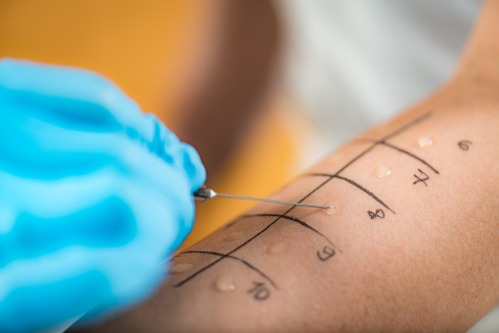
What to Expect During an Allergy Test
Allergy tests are used to determine whether or not you are allergic to a particular substance. These tests can help you identify the source of your symptoms and help your allergist develop your personalized treatment plan. If you have never been allergy tested before, here’s what you can expect during your appointment.
Preparing for Your Allergy Test
If you are planning on being allergy tested, there are a few ways you can prepare for your appointment. Initially, you should make sure to stop taking antihistamines for at least five days before your allergy test, as they can potentially interfere with the test results by suppressing your natural immune reaction. You should also double-check with your provider about any other medications you take to ensure that they will not alter your allergy test results.
Types of Allergy Tests
On the day of your allergy test, your allergist may choose to conduct one or more of a few different tests, including:
Skin Prick Test
Although there are several different types of allergy tests, the most common is a skin prick test. This test involves placing a drop of the allergen you are being tested for onto marked sections of your skin. The skin is then pricked so that the substance may enter the body. If you are allergic to the allergen, you will likely experience a reaction, such as a red bump, within 15 minutes.
Intradermal Skin Test
The intradermal skin test is similar to the skin prick test, but the allergen is injected into your skin instead of being placed on the surface. Since this test can trigger a stronger allergic reaction, it is usually used once a skin prick test has not caused a reaction.
Patch Test
The patch test is different from the skin prick and intradermal test in that it can be used to identify an allergen that causes symptoms over the next few days. A small amount of the allergen is placed on a patch that is then applied to your skin. The patch is typically left on your skin for 48 hours to determine if you have an allergic reaction.
Oral Challenge Test
A challenge test is often used to confirm the results of the skin tests and is only performed under an allergist’s direct supervision. The test involves ingesting a small amount of allergen to watch for signs of an allergic reaction. If no adverse symptoms arise, you may be given a larger dose of the allergen. After each dose, your allergist will observe you for a set period of time to ensure that you do not have a reaction.
Blood Test
Along with skin and challenge testing, your allergist may recommend a blood test, also known as specific immunoglobulin E (IgE) tests. This test may be utilized when a patient cannot be taken off of certain medications or if they have an underlying skin condition that could influence the results of skin testing. Blood tests measure IgE antibody levels because people with allergies often have more of these antibodies in their bloodstream.
What Do the Results of the Allergy Test Mean?
If you do not experience an allergic reaction at your allergy testing appointment, it likely indicates you are not or are no longer allergic to the substance. For example, patients with a previous penicillin allergy frequently discover that they are not truly allergic to the antibiotic during allergy testing since fewer than 10% of patients diagnosed with a penicillin allergy are actually allergic to it. A negative allergy test likely means you can safely ingest, inhale, or come into contact with the allergen without fear of an adverse reaction.
If you find out you do have an allergy, your allergist can help develop a treatment plan that may involve the following:
- Medications
- Carrying an epinephrine pen (EpiPen)
- Immunotherapy
- Biologics
- Minimized exposure
Get Allergy Testing at Northeast Allergy
If you believe you may be allergic to something, don’t wait until you have an allergic reaction to get treatment. Instead, make an appointment at Northeast Allergy to find out what is causing your symptoms. At Northeast Allergy, we can develop customized treatment plans that can help improve your quality of life.



